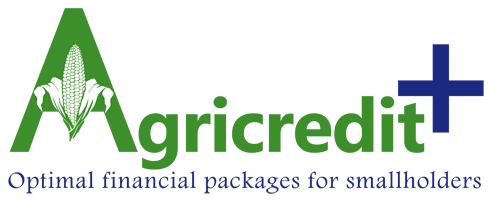RATIONALE
Farm households in Africa must cope with bad conditions as to soil quality, weather and infrastructure. The variability of rainfall causes yields to vary strongly from one year to the next. With yields already low (due to poor soil condition) these variations can be life threatening. Meanwhile, inadequate infrastructure makes it difficult to help the households with access to financial services, insurance and inputs that could stabilise their access to resources, and enhance yields.
Solving a single aspect, say bringing inputs to the farm, will not be sufficient, as credit is also needed. But credit can only be provided if sufficient likelihood exists that loans will be repaid. Here, insurance can help. If insurance of the loan makes it attractive enough for the lender, a package can be composed of inputs, credit and insurance, that solves all these problems with one bundle. Yet, the households will remain exposed to some risks as insuring against all is prohibitively expensive. What is the appropriate degree of insurance in such bundles? That is the core question addressed in this research. It aims at supplying inputs to farmers on credit, with insurance, in such a way that a good balance is found between the benefits and risks to the farmers and the profits and risks to the credit provider.
We investigate the possibilities for such a balanced approach in Kenya and Ethiopia in collaboration with a large insurance provider and a farmers’ organisation. Together with them we collect information on the costs, benefits and risks involved in using the inputs, the alternatives open to them, and the costs and benefits involved in providing credit to finance the purchase of inputs, with and without an insurance against crop failure.
With all this information, we go and talk to the stakeholders concerned to find out how they would respond if more or less insurance would be provided. Will credit suppliers lower their prices, if repayment of loan is more likely because the crop is insured? Will households decide to take higher yielding (but more risky) crops if part of the downside risk is insured? We establish this for the parties concerned in Kenya and Ethiopia, but also in other African countries.
Having established how these stakeholders respond to changes in insurance, we can proceed to derive what the best degree of insurance might be. And this is then finally tested in a field experiment.
With this knowledge we can help other suppliers of credit and insurance, and farm organisations to establish similar packages that are adapted to the local conditions for input supply, and financial services.
IMPACT
The research project aims to make a contribution to knowledge in the broad discipline of economic science, particularly in the area of adoption of financial packages that combine credit, insurance and agricultural inputs targeted at low-income farmers in Africa. Academics will gain benefit from new theories that explain how credit supply and demand work as a function of the degree of insurance addition. Multiple dimensions of the financial package - such as price, risk and benefit - will be analysed in detail, and specialised disciplines such as risk management and insurance are therefore also intended to be beneficiaries of this research. Given the crosscutting nature of the study, other disciplines related to innovative finance, climate and environmental change, and agriculture development will be major target beneficiaries.
As the project is to be implemented in Kenya and Ethiopia, involving smallholder farmers producing crops vulnerable to a variety of risks, our research findings are likely to benefit academics working in the fields of microfinance, development economics, crop insurance, and financial development for the poor. Our collaboration with Egerton University ensures that academics in Kenya will also benefit not only from the research findings but also, most importantly, from the whole research process, raising academic capabilities at every stage of the research design, implementation and dissemination of results. Great effort will be placed in creating the foundations for exchange of knowledge between Kenya and Ethiopia (and beyond) in order to benefit the academic community in Africa.
In this project we also place great importance on the interface between academia and practitioners. Our advisors, from Bath University and the African Development Institute at the African Development Bank, will ensure that high standards of academic research are met and that the usefulness of our research findings is maximised in order to improve practice and policy-making in Africa and other low-income regions, well beyond the project's life.
New datasets generated by the project will become publicly available after the project to be used by other researchers. The management of this data will follow strict quality assurance, ethical considerations and back-up procedures. The research project plans to implement randomised control trials in field experiments, the analysis of which will be disseminated in peer-reviewed publications, internal reports and international conference presentations.

